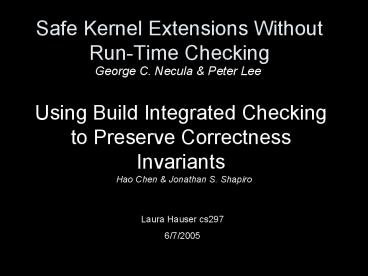Safe Kernel Extensions Without RunTime Checking - PowerPoint PPT Presentation
Title:
Safe Kernel Extensions Without RunTime Checking
Description:
EROS. Robust, mature, capability-based operating system derived from KeyKOS ... The EROS expert on the project was easily able to use the tool MOPS. Did They ... – PowerPoint PPT presentation
Number of Views:56
Avg rating:3.0/5.0
Title: Safe Kernel Extensions Without RunTime Checking
1
Safe Kernel Extensions Without Run-Time Checking
- George C. Necula Peter Lee
Using Build Integrated Checking to Preserve
Correctness Invariants
Hao Chen Jonathan S. Shapiro
Laura Hauser cs297 6/7/2005
2
Overview
- Proof-Carrying Code
- Safety Policy
- MOPS
- EROS
- Experiments using MOPS EROS
3
Problem
How can an operating system kernel determine that
it is safe to execute code supplied by an
untrusted source?
Solution
- Proof-Carrying Code (PCC)
- Code producer provides a formal proof proving the
code supplied adheres to the safety policy - This proof is easy to validate for the code
consumer
4
Safety Policy
- 3 part policy
- Floyd style VC generator
- Computes a safety predicate in first order logic
based on the code to be certified - Axioms to validate safety predicate
- Precondition
- Predicate in first order logic that the code
consumer guarantees to be valid when the PCC
binary is invoked
5
Problem
How do we maintain correspondence between
software design and implementation in a cost
effective manner?
Solution
Use static model checking tools normally used for
error detection for error prevention by
integrating them into the development lifecycle
6
How do they propose to do it?
- MOPS
- Open source, flow sensitive model checker for
temporal safety properties - EROS
- Robust, mature, capability-based operating system
derived from KeyKOS
7
What Are They Hoping to Achieve?
- Bug prevention
- Automated checks
- Simplicity
- Someone without experience with the model
checking tool should be able to use it fairly
easily - Necessary code changes should not result in
incomprehensible / unmaintainable code - Scalability
- Time issue Want to integrate MOPS into the
compile and build process
8
MOPS
- Static (compile-time) analysis tool
- Checks that programs perform certain operations
in defined sequences (temporal safety properties) - Can express many application security properties
- Properties are expressed in a finite state
automaton (FSA)
9
MOPS Restrictions
- The program is single-threaded
- The program is memory safe
- The program is written in standard compliant C
with selected GNU C extensions - The program does not violate the soundness
assumptions required by the user-specified
temporal safety property
10
The MOPS Process
Safety Property
FSA
Program satisfies safety property
C Program
CFG
Model Checker
Parser
Error Traces
FSA finite state automaton CFG control flow
graph
11
EROS(Extremely Reliable Operating System)
- Capability-based OS
- Chosen for
- Interrupt-Style Kernel
- Single-Level Store
- Caching Design
- All of these properties rely heavily on temporal
preciseness for some reason or another, making it
ideal for MOPS checking
12
Experiments
- Control Flow
- This is what MOPS is designed to check for
- Yield, Commit
- Typestate Properties
- Is it worthwhile to extend MOPS?
- Prepare Before GetRegs
13
Yield, Commit
- Every system call control path should invoke
exactly one of Yield() or Commit() - Following a call to Commit(), it is a bug to
subsequently call Yield()
14
Prepare Before GetRegs
- Any call to proc_GetRegs32 requires that the
typestate of process p is cached - Proc_Prepare(p) changes the typestate of this
process from unknown to cached - Even typestate can be reduced to temporal safety
properties most of the time
15
Did They Reach Their Goals?
- Bug Prevention
- Was able to successfully find bugs in 4 of the 5
test cases - Could not statically define one of the typestate
experiments - While not every invariant can be reduced easily
to temporal safety properties many can
16
Did They Reach Their Goals?
- Simplicity
- Found that required modifications to fix problems
often yielded more readable / maintainable code - The EROS expert on the project was easily able to
use the tool MOPS
17
Did They Reach Their Goals?
- Scalability
- Development time on the MOPS end was minimal
- Found that MOPS is minimally disruptive to the
build process - Building and linking 12.13s to 31.34s
- Model checking 100.13s only do for major builds
18
References
- George C. Necula, Peter Lee. Safe Kernel
Extensions Without Run-Time Checking.
OSDI'96,October 1996. - H.Chen and J.S.Shapiro. Using build-integrated
static checking to preserve correctness
invariants. Proceedings of the 11th ACM
conference on Computer and communications
security, Washington DC, 2004. - www.cs.ucdavis.edu/hchen/paper/ndss04.ppt































